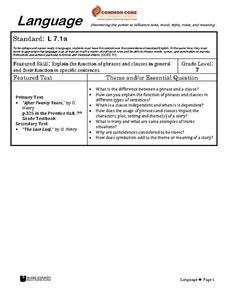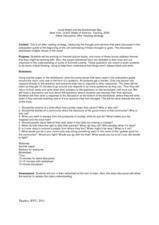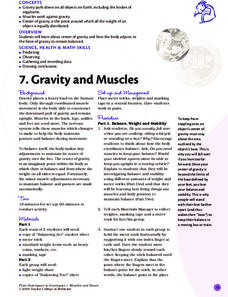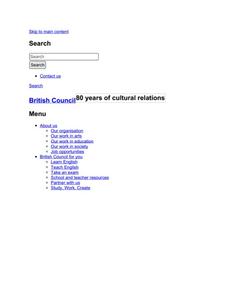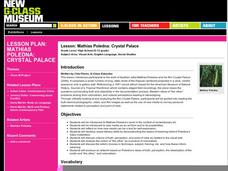Nemours KidsHealth
Stress: Grades 9-12
Everyone feels stress from time to time, but how can you move past it? A seven-page packet of activities guides high schoolers through the process of recognizing and managing their stress. The resource includes discussion topics, a quick...
Curated OER
The Language of Surprise
Aspiring writers complete and discuss fill-in-the-blank cliché expressions, define cliché as a form of predictable writing, take cliché expressions and turn them into new, unpredictable ones, read poetry that illustrates writer's use of...
Curated OER
Topical Discussions
Engaging in topical discussions can be a great way to teach kids how to build strong arguments and support their opinions with concrete evidence. High schoolers choose a controversial topic, build an argument for or against that topic,...
Overcoming Obstacles
Expressing Opinions Constructively
Everyone has opinions. The trick is to learn how to disagree in a way that doesn't cause problems. The activities in the final instructional activity in the Communication Module focuses on learning how to express opinions constructively....
Wake County Public Schools
Language
Have your class doing everything from reading literature, analyzing literary devices, identifying independent and dependent clauses, discussing, and writing creatively with the rich resource found here. After a mini lesson on independent...
Curated OER
Language and Dialect
Practice listening skills while studying oral story tellers from different parts of Louisiana. Consider the regional dialects and insider language of folk groups with your class. Identify language as part of folk life and recognize that...
Curated OER
Idioms in Everyday Language
Students describe idioms and their use in everyday language. They describe the difference between literal and idiomatic meanings. In groups, students use iPhoto to create books that explain and illustrate a variety of idioms describing...
Brigham Young University
Silent Discussion: After Reading Strategy for Lizzie Bright and the Buckminster Boy
Complete this after-reading activity for the novel Lizzie Bright and the Buckminster Boy in order to explore the books themes of societal prejudice, peer pressure, authority, and bullying. Write the seven provided questions on...
EngageNY
Grade 10 ELA Module 2: Unit 1, Lesson 2
Help readers go deeper and gain an understanding of purpose and justification while analyzing a letter written by Martin Luther King, Jr. Literature lovers discuss the letter in a variety of settings, including in pairs, groups, and...
Curated OER
Open Your Eyes Wide-Shut!
Students, using the book, Good Night, Gorilla, show how a speech pathologist uses children�s literature during whole class time to teach articulation, receptive, expressive, and written language skills.
Curated OER
Read it Like You Mean It!
First through third graders observe and demonstrate a variety of reading expression strategies. First start by reviewing some common digraphs and the sounds they make. Then listen to the teacher read different sentences with and without...
Curated OER
Card Game to Encourage Discussion
How do you get your class talking? Use a card like the one included to help English language learners join the discussion. On this card, for example, nine sentence starters are provided. You could also use this with native English...
Curated OER
Find Figurative Language
Meet with the school library specialist and work together to plan a visit and presentation on figurative language. After defining and examining examples of targeted terms, the class travels to the library where the SL has collected...
Perkins School for the Blind
Learning to Express Myself
Expressing one's wants and needs is vital for learners of any age or ability level. Young children with visual impairments and intellectual disabilities practice asking for preferred items, foods, or activities in a structured manner....
Teacher Created Materials
The Tragedy of Julius Caesar
Bring Julius Caesar to life with a reader's theatre approach that engages the entire class. The opening exercises model the importance of reading with expression while choral reading exercises permit class members to practice their...
Perkins School for the Blind
Conversation Skills
It is so important for learners with multiple disabilities to learn how to communicate for both social and functional reasons. Each child will choose a topic from the list and generate five questions related to that topic. They'll split...
Film English
Two Fingers
Ask your class to think about how song lyrics can go with a video and more with a well-sequenced lesson plan that focuses on the song "Two Fingers" by Jake Bugg. Class members work together to make predictions about the content of the...
EngageNY
The Storyteller’s Toolbox and Excerpt 4 First Read
It's story time! Scholars take a look through the eyes of a storyteller as the teacher reads aloud The People Could Fly. They also listen as the story is played on video. Learners then answer questions about the reader's facial...
Smithsonian Institution
Latino Expression
How much of your daily life is influenced by Latin American music? Take a listen—the answer may surprise you! High schoolers keep a journal to note any instances they see Latino culture represented, including the media, their school, and...
Scholastic
Writing Letters of Gratitude
A lesson begins with a discussion on gratitude—what does it mean, and for who are learners thankful? Scholars share their thoughts and feelings then choose a community worker to which they wish to share their gratitude. Writers compose a...
EngageNY
Presenting a Research-Based Claim: Effective Speaking Techniques
Take note. Scholars receive their claim drafts back to revise and write their claims and three pieces of evidence on notecards. They save the notecards to use when the verbally present their claims to the class. At the end, individuals...
Curated OER
Non-Verbal Communication
Many developmentally disabled students struggle with accurately conveying messages and interpreting those of others around them, especially when they are non-verbal. This lesson contains fun activities and exercises, such as talking with...
Curated OER
Lesson: Mathias Poledna: Crystal Palace
Film analysis takes critical thinking, connections, and context. Upper graders look at the film installation, Crystal Palace in terms of the film makers choices, presentation, and perspective of truth. After an analytical discussion of...
Curated OER
The Body Talks
Young historians examine the gestures of human subjects represented in Mannerist, Baroque and Renaissance paintings. After they play charades and attempt to match dialogue with body language, learners create a drawing that includes...






